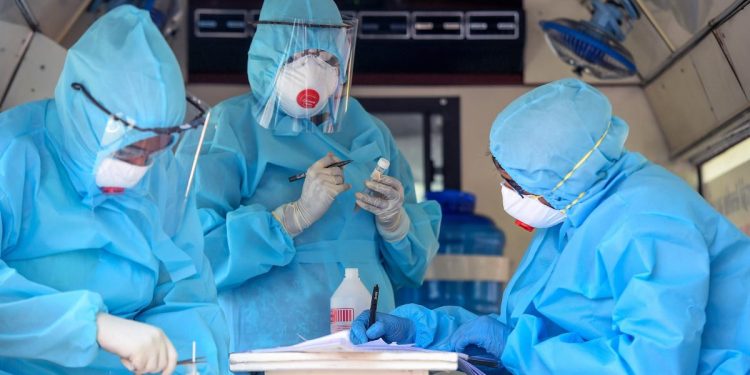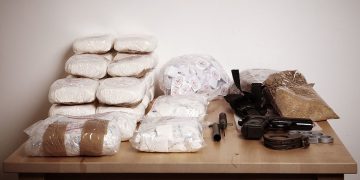Jayati Ghosh
Those who thought that a pandemic would make everyone realise the crucial role of care workers should think again. With the coronavirus still spreading rapidly, frontline workers are more essential – and at greater risk – than ever, yet public attention has shifted elsewhere.
Worse, as economies collapse and labour-market conditions deteriorate, employers in the private and public sector alike have grown more cynical in their treatment of essential workers. Far from instilling a deeper appreciation for their employees, the pandemic-induced surge in unemployment has enabled employers to exploit workers even more.
Capitalism has always had an uneasy relationship with care work. Although capitalist production relies heavily on unpaid and underpaid labour performed by women, migrants, and other disadvantaged social groups, it has historically pushed that work off the books and underground, into informality. As a result, all the varied tasks associated with social reproduction are barely recognised, much less rewarded or remunerated. Because so much care work is performed for free by women and girls within families and communities, it is simply taken for granted and, because it is outside the market, not counted as economic activity.
Unpaid work performed by women who have no other choice thus creates a vicious cycle of devaluation. When women do enter labour markets, their wages tend to be lower than those of men, not only because they are willing to work for less, but also because so much of their work is available for free. Hence, occupations dominated by women – such as in the care sector – tend to be lower paid; even men doing similar work suffer a wage penalty.
In the case of healthcare, there are additional occupational hierarchies to navigate, from highly paid ‘professionals’ like specialist physicians down to nurses, ward attendants, and cleaners. Unsurprisingly, the gender balance within each occupation changes as one goes down the pecking order, with women concentrated in the lower-status, worst-paid positions.
Globally, women hold 70 per cent of all health-care jobs. But they are more likely to be nurses, midwives, and community health workers, while men comprise a disproportionate share of better-paid occupations like surgeons, physicians, dentists, and pharmacists. Community health workers are perhaps the most exploited of all health workers, especially in developing countries. Often, they are not recognised as workers at all, but rather as ‘volunteers’ (as is true in India). As such, they rarely benefit from formal contracts that provide job security and a fair wage, let alone protections like healthcare.
Women healthcare workers are also more at risk in the current pandemic, because they are more likely to be involved in activities that require close physical contact with patients. For a brief period after the pandemic first erupted, these workers were widely recognised for their critical contributions to society. Around the world, political leaders and members of the public applauded essential workers, singing their praises from balconies and leaving flower bouquets outside hospitals.
But while healthcare workers at all levels were rightly described as “heroes,” that seems to have represented the extent of their reward. The public acclaim has not translated into better working conditions or higher wages, and certainly not systematic efforts to ensure their physical safety during the pandemic.
For example, in the United States, a brief period during which some companies offered their frontline workers slightly higher wages was soon followed by reversion to the norm: wages returned to their previous lows – and sometimes went lower. Similarly, in the United Kingdom, Prime Minister Boris Johnson thanked the immigrant nurses – “Jenny from New Zealand,” “Luis from Portugal” – who saved his life when he was hospitalized with COVID-19. But then he had no problem trying to slap a surcharge on immigration fees (ironically for the purpose of funding the National Health Service).
The situation in developing countries is even worse. Governments faced with falling tax revenues are practicing austerity in the midst of a health emergency and recession, slashing non-COVID-19 health spending, forcing pay cuts and longer hours on health workers, and avoiding the expense of procuring personal protective equipment.
So blatant is the official disregard for essential workers that doctors and nurses in India have threatened to resign, while health workers in the Democratic Republic of the Congo have gone on strike after months of working without pay. Likewise, the needs of underpaid and vulnerable sanitation workers have been systematically ignored.
Decades of public neglect and underspending have brought us to the point that even an unprecedented global health emergency and economic collapse are not enough to make mistreatment of low-paid essential workers socially and politically unacceptable. If our societies are to survive at all, something will have to shake us from our complacency. Essential care workers deserve real pay and protections, not mere lip service. Our applause is no longer enough to keep them safe.
Jayati Ghosh is Professor of Economics at Jawaharlal Nehru University in New Delhi, Executive Secretary of International Development Economics Associates, and a member of the Independent Commission for the Reform of International Corporate Taxation. @Project Syndicate.






































